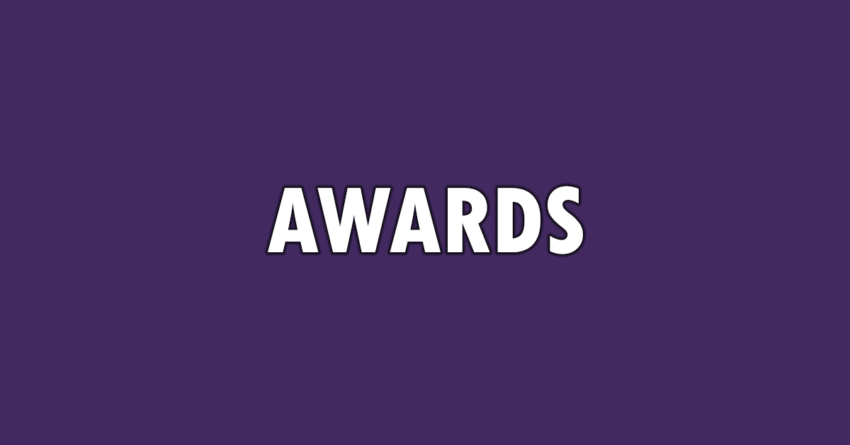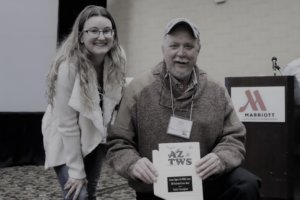We congratulate each of our deserving 2018 awardees:
Barbara Hawke, John Goodwin, Stan Cunningham, Holly Barton, and Kay Nicholson.
Every February we come together to recognize our best, chosen among the many deserving people nominated each year by their peers. This year marked the 52nd Joint Annual Meeting of the Arizona and New Mexico Wildlife and Fisheries Societies, hosted in Albuquerque, NM. We encourage our members to nominate deserving people or organizations for these annual awards, and as has been the case in the past, our chapter was privileged this year to receive several worthy nominations for well-deserving individuals working to conserve wildlife. Below are summaries of each award, awardee, and the outstanding achievements for which they were nominated.
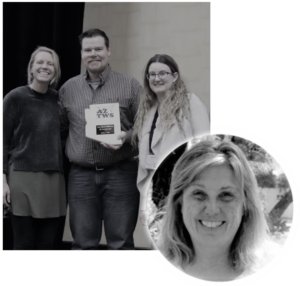
Barbara Hawke
Conservation Award
The Conservation Award is given to a person, or persons, not employed directly as a wildlife biologist, or an organization not directly involved in wildlife management who contribute significantly to the conservation of wildlife and/or their habitat in Arizona. Conservation can include but is not limited to research, education, legislation, and protection or enhancement of wildlife and their habitat.
Barbara Hawke was held up by her peers as one of the great Wilderness advocates of our time, and her nomination for this award, which is the first we have given posthumously, was widely endorsed. Firm but soft-spoken, her dedication to conservation was only outshone by her authenticity, kindness, and desire for building unlikely coalitions and partnerships by finding common ground. After a long and courageous battle with a rare form of cancer, Barbara passed away on June 20, 2018. Despite her prognosis, she never wavered in continuing to defend and care for Arizona’s wildlife and wildlands. More than her success, we honor her fearless work ethic and unwavering optimism in the face of overwhelming obstacles. Read more about Barbara in her nomination letter.
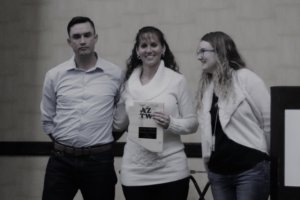
Kay Nicholson
Outstanding Service to the Chapter Award
The Outstanding Service to the Chapter Award is given to an individual who has volunteered significant time and effort to provide exceptional service to our chapter and its members.
This year we successfully surprised Kay Nicholson with the Outstanding Service to the Chapter Award, an award we reserve for those exceptional people for whom we are very grateful. Kay has served in numerous volunteer roles, Board and Chair positions with our Chapter over the last eight years. She led organizing the JAM in 2018 during her year as President of the Chapter, and she continues to be an active part of our team today. Thank you for your selfless dedication and leadership Kay!
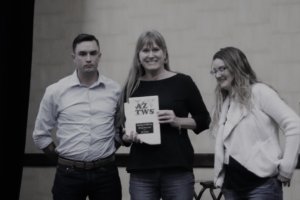
John Goodwin
Doug Morrison Award
The Doug Morrison Award is given in memory of Doug Morrison to an Arizona Biologist in a non-supervisory position who has made significant contributions to the management and conservation of wildlife in Arizona. This Award exemplifies the dedicated work ethic of the Chapter’s former President and U.S. Forest Service Biologist, Doug Morrison. Contributions are in areas of wildlife research, education, and training, management, or law enforcement.
Among the many wildlife species John Goodwin has worked with, he has been most notably instrumental with regard to Masked Bobwhite Quail conservation. As an Arizona Game and Fish biologist, John studied Masked Bobwhite beginning in 1975, developing and applying new call-box and foster parent approaches. John has been a member of the Masked Bobwhite Quail Recovery Team member since 2009, and in retirement, John has been a critical help in reestablishing Masked Bobwhite Quail on the Buenos Aires National Wildlife Refuge during the last two years. After successful releases this year, and due to John’s guidance and expertise, we now have a small population of wild Masked Bobwhite Quail on the refuge for the first time in decades. Congratulations, John!
Stan Cunningham
Professional Service Award
The Professional Service Award is given to an Arizona biologist for outstanding contributions to management and conservation of wildlife. This individual is also recognized for their professional work standards and conduct. Contributions are in the areas of wildlife research, education, and training, management, conservation, or law enforcement.
We have previously recognized Stan Cunningham with the Doug Morrison Award for his direct biology work. This year, we honor Stan for igniting the passion of countless individuals to pursue the world of wildlife biology. He has been instrumental in providing the skills these new professionals need in order to thrive. As a professor at Arizona State University, Polytechnic Campus, Stan is one of the most highly regarded instructors among students. We award Stan with the Professional Service Award for helping garner a robust new generation of wildlife biologists.
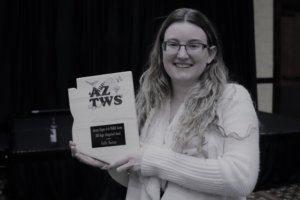
Holly Barton
Roger Hungerford Award
The Roger Hungerford Award is given to a student who, while attending an Arizona college or university, made significant contributions to the management and conservation of Arizona’s wildlife and/or habitat. Contributions are in the areas of wildlife research, education and training, management, conservation, or law enforcement. The Award is given in memory of one of Arizona’s finest research biologists, Roger Hungerford.
This year we break ground by awarding, for the first time, the Roger Hungerford Student Award to a non-wildlife degree student. Holly Barton isa graduate in Environmental Planning at the University of Arizona. Holly provides us with an impressive glimpse of a growing future in interdisciplinary, women-led, native-led, climate-conscience wildlife conservation, and we look forward to following her career.
Holly says, “My apologies for not being able to attend the AZ/NM Joint Annual Meeting. I am both humbled and honored to be receiving the Roger Hungerford Student Award. I would also like to thank the numerous individuals whose accumulation of sharing their time, energy, and knowledge that resulted in not only this award but in my personal and professional development.
When I worked at the Tohono O’odham Wildlife and Vegetation Management Program, I quickly learned that the majority of my job was to manage the impact of human actions that would affect the wildlife and habitat. This troubled me as I felt as much preventive efforts that were being done, these were past plans and decisions that pushed my duties into doing damage control. Instead of receiving questions like “how can we improve managing our resources to better align with our values” or “how do we want our communities to look like,” I received more questions about “what was my program willing to negotiate for a project?” It was this reason why I decided to pursue planning and learn about the processes (e.g. economic and governmental) that previously affected wildlife management efforts.
Throughout this process, I gained support network that included the Coalition for Sonoran Desert Protection, the Arizona Game and Fish Department, and other tribal wildlife programs who offered their knowledge, even when my first mode of contact was initiated by a random cold call. I sincerely thank you each of you for helping me reach my goals. Ahe’hee.”

